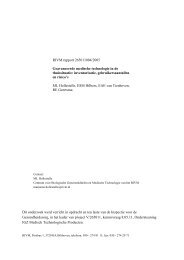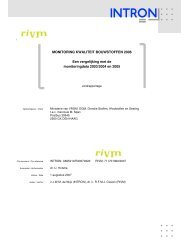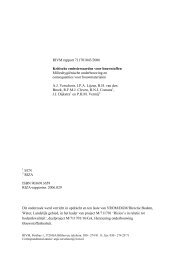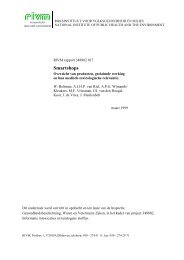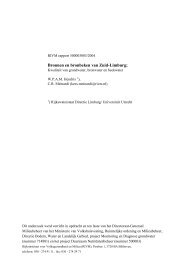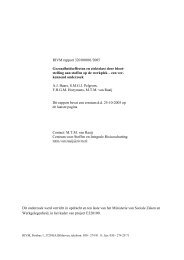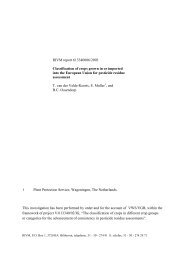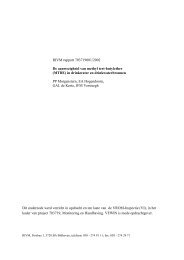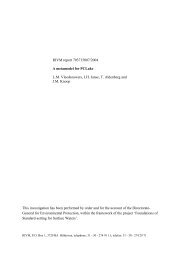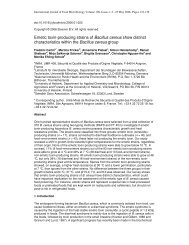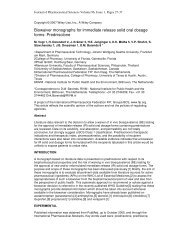The Contribution of cocoa additive to cigarette smoking addiction
The Contribution of cocoa additive to cigarette smoking addiction
The Contribution of cocoa additive to cigarette smoking addiction
Create successful ePaper yourself
Turn your PDF publications into a flip-book with our unique Google optimized e-Paper software.
Page 34 <strong>of</strong> 207 RIVM report 650270002<br />
Caffeine<br />
combination with known carcinogens resulted in decreased incidences <strong>of</strong> lung<br />
tumours in mice treated with urethane, <strong>of</strong> mammary tumours in rats treated with<br />
diethylstilboestrol and <strong>of</strong> skin tumours in mice treated with either ultraviolet light or<br />
<strong>cigarette</strong>-smoke condensate (1).<br />
Reproduction <strong>to</strong>xicology<br />
Human<br />
Total caffeine intake, as determined from various sources including c<strong>of</strong>fee, tea, cola<br />
and drugs, was positively associated with the proportion <strong>of</strong> low-birthweight babies<br />
after controlling for <strong>smoking</strong> and other potential confounders (1).<br />
For spontaneous abortion, five studies were evaluated; the combined odds ratio was<br />
1.36 (95% confidence interval 1.29-1.45), indicating that mothers who consumed<br />
caffeine had a higher risk <strong>of</strong> spontaneous abortion than those who did not. <strong>The</strong> birth<br />
weight <strong>of</strong> the babies showed a statistical correlation with the caffeine consumption<br />
during pregnancy (28).<br />
In human some conflicting results were reported about the effects <strong>of</strong> caffeine and<br />
c<strong>of</strong>fee consumption on fertility. Some studies did not show any correlation between<br />
caffeine intake and fertility and other studies showed a threshold and negative doseresponse<br />
correlation between caffeine intake and fertility (29).<br />
Animal<br />
Caffeine in a dose <strong>of</strong> 25 mg/kg body weight administered by oral gavage <strong>to</strong> pregnant<br />
rats on days 8-9 <strong>of</strong> gestation caused delayed neuraltube closure in rat embryos; also<br />
the development <strong>of</strong> the heart, eyes and limbs were reduced.<br />
From the various recent studies on the reproductive <strong>to</strong>xicity <strong>of</strong> caffeine, it is evident<br />
that administration <strong>of</strong> caffeine during pregnancy affects the normal differentiation <strong>of</strong><br />
foetal ovaries and testis resulting in significant foetal and post natal growth<br />
retardation and an increase in post natal mortality and impaired brain differentiation<br />
resulting in delayed closure <strong>of</strong> the neural tube (8).<br />
Mutagenicity<br />
Human<br />
Cultured human lymphocytes from volunteers on a regime <strong>of</strong> 800 mg caffeine daily<br />
for four weeks, resulting in caffeine blood levels as high as 29.6 µg/ml after four<br />
weeks showed no significant increase in the frequency <strong>of</strong> chromosomal damage.<br />
Drinking c<strong>of</strong>fee or tea <strong>to</strong> result in a <strong>to</strong>tal caffeine intake corresponding <strong>to</strong> that in five<br />
cups <strong>of</strong> c<strong>of</strong>fee per day [exact amount not stated] was associated with increased<br />
micronucleated reticulocytes and micronucleated mature erythrocytes in<br />
splenec<strong>to</strong>mized but otherwise healthy individuals after adjustment for <strong>smoking</strong>.<br />
Drinking decaffeinated c<strong>of</strong>fee was not associated with an increase in the number <strong>of</strong><br />
micronucleated cells.<br />
Although it has been suggested that caffeine may induce gene mutations in mammals<br />
and man, direct evidence in vivo is limited. <strong>The</strong> indirect evidence is based largely on<br />
extrapolation from results in lower organisms, in which there is no doubt about the<br />
mutagenic action <strong>of</strong> caffeine, and from cultured mammalian cells, in which caffeine<br />
is clas<strong>to</strong>genic at high concentrations (1).<br />
Animal<br />
Using dominant lethal method, no significant increase in dominant-lethal mutations<br />
(embryonic deaths) were found, whether expressed as early deaths per pregnant<br />
female or as mutation index in animals consuming caffeine in drinking water at 3.6,<br />
13.4, 49 and 122 mg/kg for 8 weeks. Although males consuming the two highest



